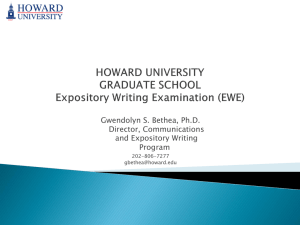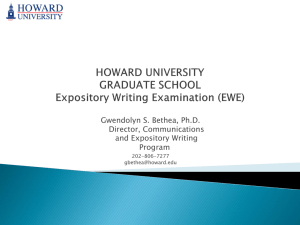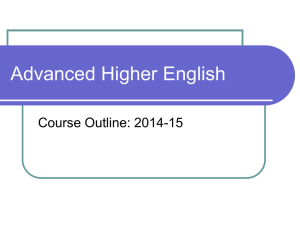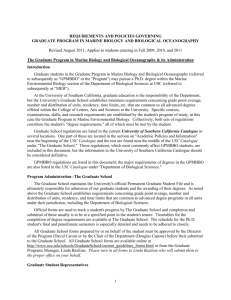PhD Program Admissions and Degree Requirements
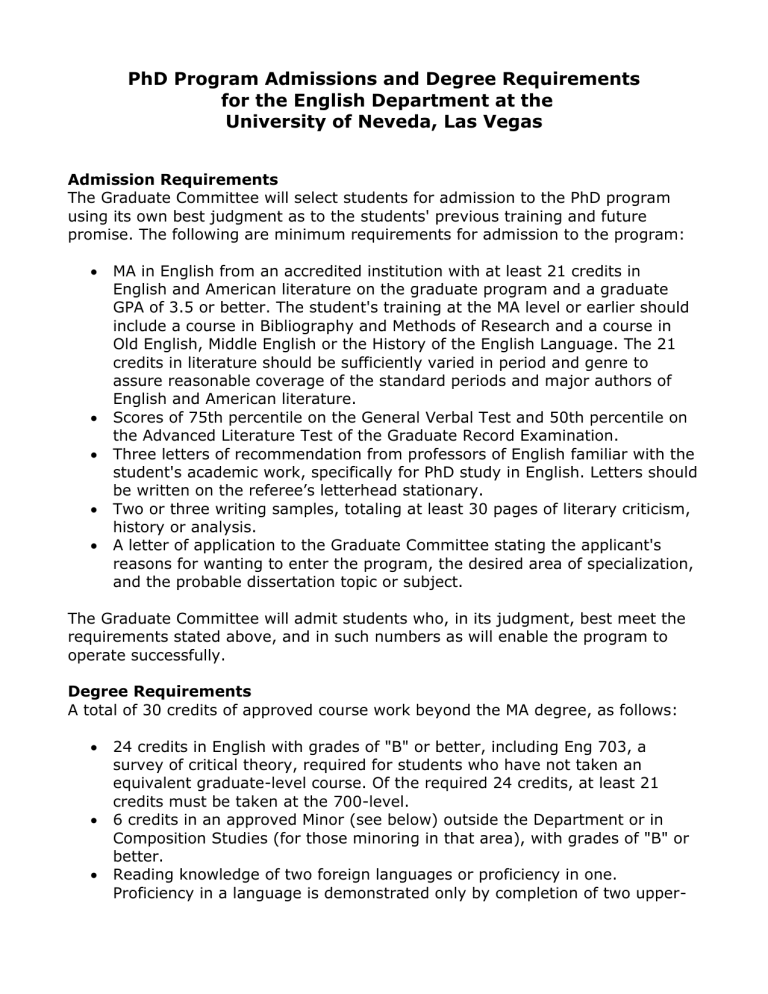
PhD Program Admissions and Degree Requirements
for the English Department at the
University of Neveda, Las Vegas
Admission Requirements
The Graduate Committee will select students for admission to the PhD program using its own best judgment as to the students' previous training and future promise. The following are minimum requirements for admission to the program:
MA in English from an accredited institution with at least 21 credits in
English and American literature on the graduate program and a graduate
GPA of 3.5 or better. The student's training at the MA level or earlier should include a course in Bibliography and Methods of Research and a course in
Old English, Middle English or the History of the English Language. The 21 credits in literature should be sufficiently varied in period and genre to assure reasonable coverage of the standard periods and major authors of
English and American literature.
Scores of 75th percentile on the General Verbal Test and 50th percentile on the Advanced Literature Test of the Graduate Record Examination.
Three letters of recommendation from professors of English familiar with the student's academic work, specifically for PhD study in English. Letters should be written on the referee’s letterhead stationary.
Two or three writing samples, totaling at least 30 pages of literary criticism, history or analysis.
A letter of application to the Graduate Committee stating the applicant's reasons for wanting to enter the program, the desired area of specialization, and the probable dissertation topic or subject.
The Graduate Committee will admit students who, in its judgment, best meet the requirements stated above, and in such numbers as will enable the program to operate successfully.
Degree Requirements
A total of 30 credits of approved course work beyond the MA degree, as follows:
24 credits in English with grades of "B" or better, including Eng 703, a survey of critical theory, required for students who have not taken an equivalent graduate-level course. Of the required 24 credits, at least 21 credits must be taken at the 700-level.
6 credits in an approved Minor (see below) outside the Department or in
Composition Studies (for those minoring in that area), with grades of "B" or better.
Reading knowledge of two foreign languages or proficiency in one.
Proficiency in a language is demonstrated only by completion of two upper-
division or graduate courses in the literature of that language with grades of
"B" or better.
Superior performance on a Qualifying Examination (see below) to be administered by the Graduate Committee upon the completion of course work.
Dissertation of high quality and substantial length containing original thought and/or scholarship on a topic or author in English or American literature, or world literature in English (18 credits).
The total credits for course work and dissertation is thus a minimum of 48 beyond the MA degree. Courses taken to make up deficiencies, or in fulfillment of the foreign language requirement (unless the Minor includes advanced courses in a foreign literature), do not count in this total.
All candidates for the degree must spend at least one year as full-time resident students at UNLV taking a full load of 9 credits each semester and not otherwise employed--for Graduate Assistants a full load may be 6 credits.
The Minor
Two coherently connected courses (6 credits) at the graduate level (600 or 700level) in a discipline outside the Department but related to English, or two graduate English courses in Composition Studies (see below). Typically, Minors will be designed in consultation with the Advisor to enlarge the student's perspective on the literary period and the literary form in which the student is specializing.
For example, a student concentrating on modern American literature and planning a dissertation in that area, might put together the following Minor:
Art 687 History of American Art*
History 730 Colloquium in American History
Similar, coherently connected courses could be put together on a variety of subjects relevant to literary study. They could involve two different disciplines, as above, or be confined to a single department. The following pairing in History alone, for example, would be useful to any student of English literature:
History 635 European Intellectual History I
History 636 European Intellectual History II
Minors would ordinarily be developed from courses in Art, Foreign Languages,
History, and Theater Arts. A Minor in a Foreign literature would also fulfill the foreign language requirement for proficiency in one language.
The Composition Studies Minor
This six-credit Minor consists of two English Dept. courses in Composition theory, methodology, or other subjects. It represents a separate area that may or may
not be related to the literary period and literary form. Minors in Composition need take no courses outside the department. Unlike other minors, the Composition
Studies Minor becomes the third exam area of the Qualifying Exam (see below).
The Qualifying Examination
The Qualifying Examination consists of a twelve-hour, three-part, written examination (administered on three different days), plus a 90-minute oral examination. It is to be taken and passed after course requirements, the foreign language requirement, and the Minor are completed and before work on the dissertation is begun. With the exception of the Minor in Composition Studies, this examination does not explicitly cover the subject matter of the Minor, which is completed by course work alone, although knowledge acquired through the Minor may well be used on the examination. The student must pass the Qualifying
Examination on the first or second attempt or be disqualified from continuing the program.
In Part One of the examination the student will be required to show intensive and detailed knowledge of the literature in English of one of the following periods:
Old and Middle English
Renaissance
Restoration and 18th Century
19th Century British
American literature to 1900
20th Century literature
In Part Two of the examination the student win be required to show an extensive and substantial knowledge of the literature (in English or in translation) in one of the following literary forms:
Drama
Lyric and reflective poetry
Epic and narrative poetry
Prose fiction
Non-fiction prose
In Part Three of the examination the student will be required to show an extensive and substantial knowledge of
an additional time period chosen from the list in Part One
a major author chosen from outside of the student's selected time period and genre areas
a special topic, such as literature of the American West, satire, or
literary theory, that is approved by the student’s committee, or Composition
Studies, if that is the student's Minor.
The student's selection of a literary period, a literary form, and either an additional period or a major author in which to specialize will reflect the probable dissertation subject. A student planning a dissertation on Dickens, for example, might elect
"19th Century British" and "Restoration and 18th Century" as the periods of specialization and "Prose Fiction" as the literary form, and would choose courses in
English pertinent to those periods and that form.
This exam is scheduled at some time after the student has completed his/her 30 credits of required course work The student chooses an examination committee of three faculty members, the majority of whom normally are in the student’s field of specialization. The student chooses a faculty member from another department to be their Graduate College Representative. The student is responsible for getting signatures on the appropriate form (see http://english.unlv.edu/gradforms.htm) from his/her Committee members that they are willing to serve on the Committee.
Committees may or may not choose to provide the student with a reading list of primary and secondary works in the student’s areas of examination. If such lists are provided, they may serve as guides to the examining fields rather than exclusive/exhaustive lists. How these lists are used is up to the examination committee.
The student is responsible for finding a suitable date (in consultation with his or her Committee) and room for taking his/her written exams. (Departmental secretaries’ help may be sought here; see http://english.unlv.edu/staff.htm; FDH
608 is frequently available if scheduled far enough in advance.) Three of these exams must be taken and each lasts four hours. (Information about what periods are covered in the exam may be found in the accompanying description of the PhD program.) The number of questions and the kinds of questions asked are determined by each committee. Many faculty members have given these exams and may have sample questions that can be provided to students.
After the written exams are completed, the student and her or his Committee should schedule an oral exam in a timely manner (i.e., within one or two weeks after the written exams); again, the student should schedule a time and place for this exam in consultation with his or her Committee. This exam may cover material discussed in the written exam; it may also cover as well material not asked about on the written exams but for which the student was responsible. A
DEPARTMENTAL FORM (there is no Graduate College form; see http://english.unlv.edu/pdfs/compexam.pdf) should be signed at this exam by all
Committee members, stating whether or not the students has passed their
Comprehensive Exam, written and oral. Designations of “Honors,” “Pass,” or “Fail” may be given for the Comprehensive Exam.
The Chair of the Examination Committee sends to the Director of Graduate Studies an assessment (300-500 words) of the student’s performance on the exam.
After the Qualifying Exam is passed, the student, in consultation with his or her
Committee, prepares a Dissertation Prospectus, a form for which is on the
Graduate College website (see http://english.unlv.edu/gradforms.htm).
When the dissertation is completed, it is defended in a final exam. The student should arrange for the date, time and room for this examination. All Committee members must be present. When the Defense is passed, a form must be signed by all Committee members (see http://english.unlv.edu/gradforms.htm).
The Chair of the Dissertation Committee sends to the Director of Graduate Studies an assessment (300-500 words) of the student’s dissertation.
The Dissertation
After passing the Qualifying Examination, and normally in the third or fourth year of the program, the student will begin a doctoral dissertation under the direction of an Advisor and a Thesis Committee approved by the Graduate Director of the
Department. The Prospectus for this Dissertation must be approved, and the
Dissertation written, under the close supervision of the Advisor and the Thesis
Committee. Upon completion, it must be approved without dissent by the members of the Thesis Committee and by a representative of the Graduate Faculty of the University from outside the Department of English.
Representative Course of Study
In the first two or three years the student completes the course requirements of the program. Courses are chosen in consultation with the Advisor to meet
Departmental requirements, complete the Minor, and prepare for the Qualifying
Examination. A student contemplating a dissertation on Milton, for example, and thus selecting the Renaissance and Epic and narrative poetry for the Qualifying
Examination, might take the following courses over a three-year period:
Year One
703 Literary Theory
728 Milton
724 Early 17th Century Literature
Course for Minor
Foreign Language courses as needed
Year Two
723 Renaissance
734 Romantic Poetry
720 Medieval Literature
722 Chaucer
Independent Study as needed
Foreign language courses as needed
Year Three
760 Epic Poetry
725 Shakespeare
Course for Minor
Independent Study as needed
Foreign language course as needed
These courses would constitute a concentration in the Renaissance as a period and in Epic and narrative poetry as a form. The Minor might consist of courses in medieval and Renaissance art, philosophy, and history, using appropriate graduate courses when available. The course in Chaucer would help prepare the student for an area exam in Chaucer as a major author.
An Independent Study course or two might be substituted for the regular graduate courses in English, but students should enroll in regular graduate courses whenever possible. They would be identified as PhD candidates and given intensive work pertinent to their interests and plans.
After the two or three years of course work described above, the student takes and must pass the Qualifying Examination. The Dissertation would then be written, carrying 18 credits (the equivalent of one year at full time) and normally being completed in one or two years.
The minimum time required for the completion of the PhD program would be three years, the normal time perhaps four or five, and the maximum allowable six.

